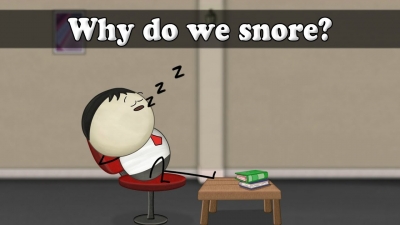
Snoring is nothing but the sound produced by the vibration of certain parts in the upper airways. When we sleep, our body muscles, including those in the upper airways, relax and the soft tissues such as the tongue, soft palate, uvula and tonsillar pillars become slack. Sometimes they relax so much that the upper respiratory tract partly closes and becomes too narrow for enough air to travel through to the lungs. When we inhale, the air hits these respiratory structures, causing them to vibrate and create the turbulent sound we call snore. The narrower the airway, the louder the snoring.
Anything that prevents you from breathing through your nose can cause you to snore. This can include congestion from a cold and allergies. Those who have enlarged tonsils, an enlarged tongue or excess weight around the neck are more prone to snoring.
Normal ageing can also relax your throat and tongue muscles, causing snoring. Snoring is also a symptom of sleep apnoea, a potentially serious sleep disorder in which breathing repeatedly stops and starts.
Picture Credit : Google
